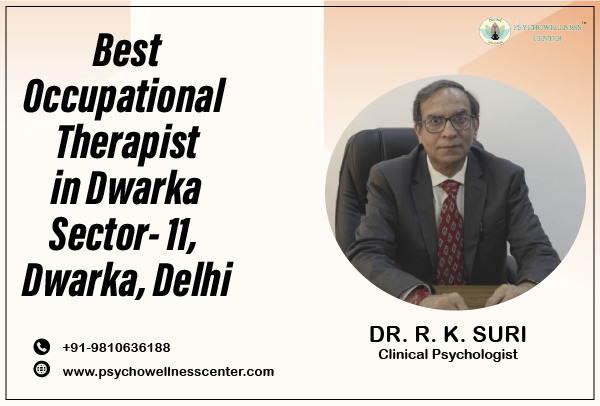Mental health challenges such as anxiety, stress, depression, and trauma can significantly affect daily life. They affect one’s ability to perform everyday tasks, maintain relationships, and engage in meaningful activities. Occupational therapy (OT) plays a crucial role in mental health recovery by helping individuals regain self-confidence, improve self-esteem, and develop coping strategies for emotional well-being.
Understanding Occupational Therapy in Mental Health
Occupational therapy is a client-centered approach that helps individuals participate in meaningful daily activities despite physical, cognitive, or emotional challenges. Unlike traditional psychotherapy, which focuses on thoughts and emotions, OT emphasises practical interventions that enable individuals to regain independence and function effectively in their daily lives.
For individuals experiencing panic attacks, depression, or trauma, occupational therapy provides structured interventions that improve emotional regulation, coping skills, and social participation.
How Occupational Therapy Aids Mental Health Recovery
1. Enhancing Daily Functioning
Mental health conditions often disrupt daily routines, making it difficult to manage personal care, work, or social responsibilities. Occupational therapists help individuals:
- Develop structured routines to reduce stress and enhance productivity.
- Improve self-care habits, such as hygiene, meal preparation, and exercise.
- Learn strategies to manage panic attacks and emotional distress.
By incorporating these structured activities, individuals regain a sense of self-confidence and control over their lives.
2. Improving Emotional Regulation
Anxiety, trauma, and stress can lead to emotional instability. Occupational therapy provides techniques such as:
- Mindfulness-based therapy helps individuals stay present and reduce overwhelming emotions.
- Sensory integration therapy to manage emotional triggers through calming activities.
- Cognitive-behavioural therapy restructures negative thought patterns.
These strategies enhance emotional resilience, allowing individuals to navigate challenges with greater ease.
3. Boosting Self-Esteem and Social Skills
Many individuals with depression or anxiety struggle with low self-esteem and difficulty engaging in social interactions. Occupational therapists help by:
- Encouraging participation in social activities to build self-confidence.
- Teaching communication skills to reduce social anxiety.
- Using role-playing exercises to prepare individuals for real-life social situations.
Developing these skills improves social relationships and fosters a sense of belonging.
4. Addressing Sensory Processing Issues
Certain mental health conditions, such as trauma and panic attacks, can heighten sensory sensitivities. Occupational therapy uses sensory-based interventions to:
- Help individuals manage noise, light, and touch sensitivities.
- Develop personalised sensory diets that regulate emotions.
- Introduce relaxation techniques to create a sense of calm.
These interventions support individuals in navigating their environments without feeling overwhelmed.
5. Developing Coping Strategies for Stress Management
Chronic stress and anxiety can be debilitating. Occupational therapists equip individuals with tools to manage stress, including:
- Time management techniques to reduce overwhelm.
- Relaxation exercises like deep breathing and guided imagery.
- Task breakdown methods to make responsibilities feel more manageable.
These strategies empower individuals to handle daily pressures with confidence.
6. Supporting Workplace and Educational Success
Mental health conditions often impact performance at work or school. Occupational therapy offers vocational and academic support, such as:
- Adapting work environments to accommodate mental health needs.
- Teaching organisational skills to improve focus and productivity.
- Implementing strategies to prevent burnout and stress.
By addressing these challenges, individuals can maintain fulfilling careers and academic progress.
Occupational Therapy Techniques Used in Mental Health Recovery
Occupational therapists use a range of evidence-based techniques to support mental health, including:
- Activity-Based Interventions – Engaging in hobbies and creative activities to boost mood and reduce depression.
- Cognitive Behavioral Strategies – Identifying and modifying negative thought patterns.
- Mindfulness and Relaxation Therapy – Teaching deep breathing, progressive muscle relaxation, and guided imagery to manage anxiety and panic attacks.
- Social Skills Training – Improving interpersonal communication and reducing social stress.
- Sensory Integration Therapy – Using sensory-based activities to manage emotional responses.
- Time Management and Organisational Skills – Enhancing focus and reducing feelings of being overwhelmed.
The Role of Expert Therapists in Mental Health Recovery
Professional guidance is essential in addressing complex mental health challenges. Experts at Psychowellness Center, R K Suri, Utkarsh Yadav, Kamal Agarwal, Sakshi Dhankhar, and Tanu Sangwan offer specialised occupational therapy services tailored to individual needs.The specialists at Psychowellness Center integrate psychotherapy with occupational therapy to provide a holistic approach to mental health recovery. Their focus on daily life skills and emotional well-being helps clients regain independence.
1. R K Suri
With extensive experience, he is a clinical psychologist in mental health, R K Suri combines cognitive and activity-based interventions to enhance self-confidence, reduce stress, and improve emotional resilience.
2. Utkarsh Yadav
Utkarsh Yadav specialises in using sensory-based interventions and behavioural techniques to address anxiety, panic attacks, and trauma. His approach fosters emotional stability and functional independence.
3. Kamal Agarwal
Kamal Agarwal focuses on vocational rehabilitation, helping individuals develop skills for workplace success. His expertise in stress management strategies ensures clients can handle job-related challenges effectively.
4. Sakshi Dhankhar

